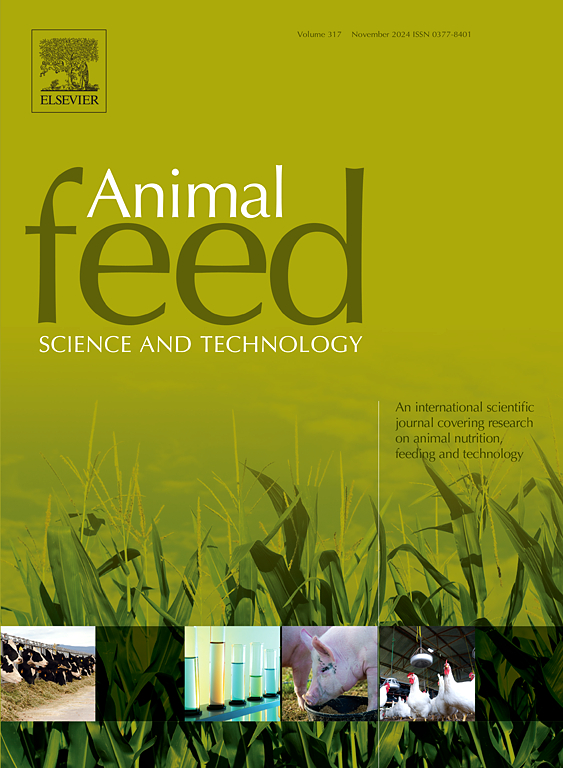丁酸钠通过调节肠道黏膜屏障和微生物群改善高脂肪饲料诱导的大口黑鲈生长迟缓和肠道损伤
IF 2.5
2区 农林科学
Q1 AGRICULTURE, DAIRY & ANIMAL SCIENCE
引用次数: 0
摘要
本试验旨在验证丁酸钠对高脂肪饲料诱导的大口黑鲈(Micropterus salmoides)肠道损伤和生长抑制的缓解作用。共设计5种饲粮:4种高脂饲粮(18 %粗脂肪),分别添加0 % (HF)、0.05 % (HFS1)、0.1 % (HFS2)和0.2 % (HFS3)的丁酸钠,以及1种对照饲粮(10 %粗脂肪)。随机分配3个试验池,每个试验池30尾鱼。鱼(4.0 g)喂饱60天。结果表明,与c相比,HFS1、HFS2和HFS3饲料显著降低了鱼的生长,诱导了氧化应激、粘膜屏障功能障碍、肠道炎症和肠道生态失调。然而,与HF相比,HFS1、HFS2和HFS3饲料显著提高了采食量和增重率,通过增加抗氧化防御(如总超氧化物歧化酶、过氧化氢酶、谷胱甘肽过氧化物酶、还原性谷胱甘肽、以及核因子e2相关因子2)和降低丙二醛含量,通过上调occludin、mucin3a、区闭塞-1、缺氧诱导因子-1α和溶菌酶的表达增强粘膜屏障,通过下调白细胞介素1β和肿瘤坏死因子α的表达水平减轻炎症(P <; 0.05)。此外,与HF相比,HFS1和HFS3显著降低了微内球菌和中菌原体的丰度,而HFS1增加了乳球菌的丰度(P <; 0.05)。相关分析显示,粘膜屏障蛋白和肠道菌群(如Tenericutes、Mesomycoplasam和Lactococcus)与鱼类生长和肠道损伤之间存在显著关系(P <; 0.05)。这些发现表明,丁酸钠可以帮助减轻高脂肪饲料对鱼类生长和肠道健康的有害影响。本文章由计算机程序翻译,如有差异,请以英文原文为准。
Sodium butyrate ameliorates high-fat diet-induced growth retardation and gut injury in largemouth bass (Micropterus salmoides) by modulating gut mucosal barrier and microbiota
The investigation was to validate the alleviating effect of sodium butyrate on high-fat diet-induced gut injury and growth inhibition in largemouth bass (Micropterus salmoides). Five diets were designed: four high-fat diets (18 % crude lipid) supplemented with sodium butyrate at 0 % (HF), 0.05 % (HFS1), 0.1 % (HFS2), and 0.2 % (HFS3), as well as a control diet (C, 10 % crude lipid). Three tanks (30 fish each tank) were randomly allocated to each diet. Fish (4.0 g) were fed to apparent satiation for sixty days. Results indicated that HF dramatically reduced fish growth and induced oxidative stress, mucosal barrier dysfunction, gut inflammation, and gut dysbiosis compared to C. However, in comparison to HF, HFS1, HFS2, and HFS3 diets significantly promoted feed intake and weight gain rate, relieved oxidative stress by increasing antioxidant defense (e.g., total superoxide dismutase, catalase, glutathione peroxidase, reduced glutathione, and nuclear factor E2-related factor 2) and reducing malondialdehyde content, enhanced mucosal barrier by upregulating the expression of occludin, mucin3a, zona occluding-1, hypoxia-inducible factor-1α, and lysozyme, and reduced inflammation by downregulating the expression levels of interleukin 1β and tumor necrosis factor α (P < 0.05). Moreover, HFS1 and HFS3 dramatically reduced Tenericutes and Mesomycoplasma abundance, whereas HFS1 increased Lactococcus abundance when compared to HF (P < 0.05). Correlation analysis revealed a significant relationship between fish growth and gut injury with mucosal barrier proteins and gut microbiota (e.g., Tenericutes, Mesomycoplasam, and Lactococcus) (P < 0.05). These findings suggested that sodium butyrate can help mitigate the detrimental effects of high-fat diets on fish growth and gut health.
求助全文
通过发布文献求助,成功后即可免费获取论文全文。
去求助
来源期刊

Animal Feed Science and Technology
农林科学-奶制品与动物科学
CiteScore
6.00
自引率
6.20%
发文量
266
审稿时长
3 months
期刊介绍:
Animal Feed Science and Technology is a unique journal publishing scientific papers of international interest focusing on animal feeds and their feeding.
Papers describing research on feed for ruminants and non-ruminants, including poultry, horses, companion animals and aquatic animals, are welcome.
The journal covers the following areas:
Nutritive value of feeds (e.g., assessment, improvement)
Methods of conserving and processing feeds that affect their nutritional value
Agronomic and climatic factors influencing the nutritive value of feeds
Utilization of feeds and the improvement of such
Metabolic, production, reproduction and health responses, as well as potential environmental impacts, of diet inputs and feed technologies (e.g., feeds, feed additives, feed components, mycotoxins)
Mathematical models relating directly to animal-feed interactions
Analytical and experimental methods for feed evaluation
Environmental impacts of feed technologies in animal production.
 求助内容:
求助内容: 应助结果提醒方式:
应助结果提醒方式:


